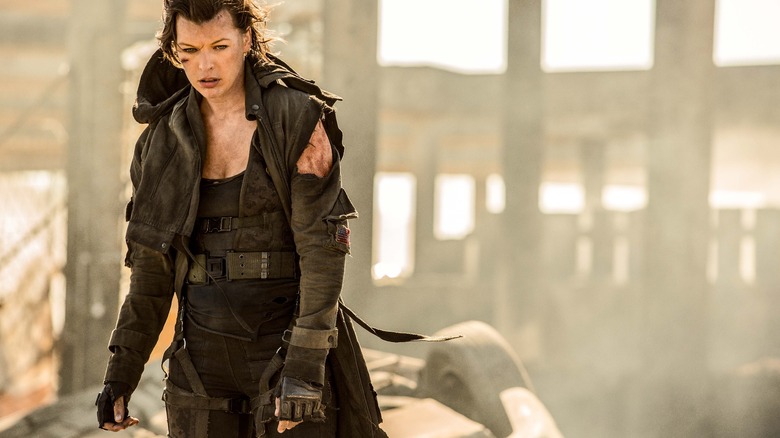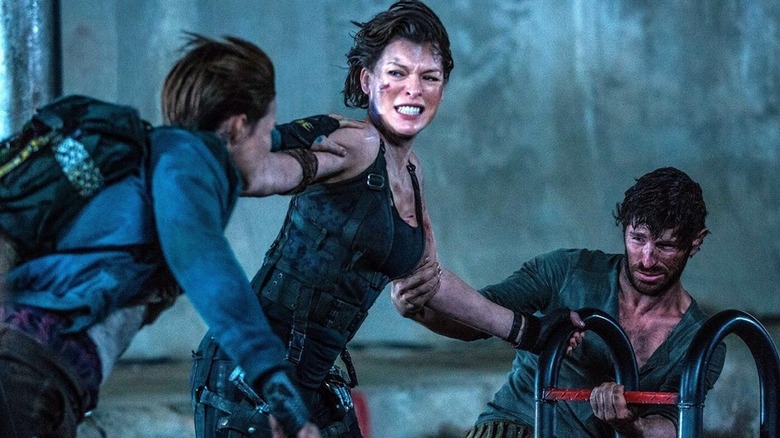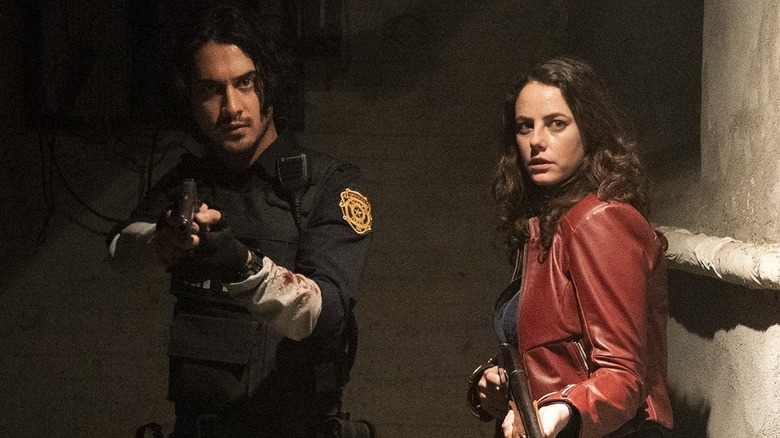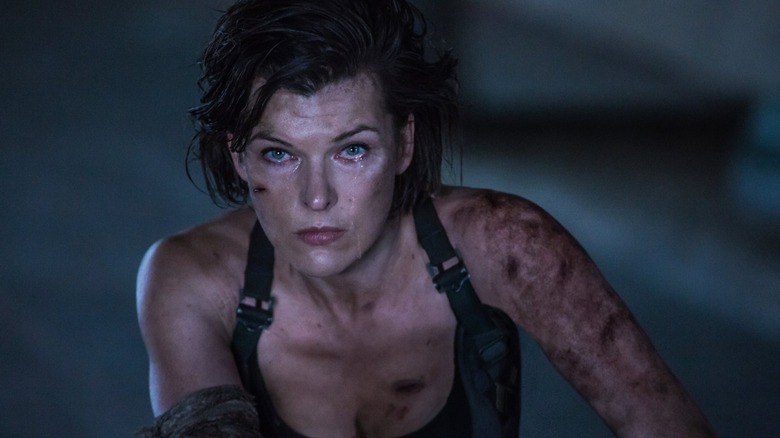The Correct Order To Watch The Resident Evil Movies
This post contains spoilers for the "Resident Evil" film franchise.
Umbrella Corporation. The name will forever be associated with unsavory, downright evil acts within the "Resident Evil" universe, catalyzing the events that define the franchise. Although Capcom's "Resident Evil" games have their own set of canonical events concerning Umbrella Corp., the film adaptations that branched into their own universe also paint this multinational conglomerate in a rather infamous light. In every iteration, Umbrella is never up to any good: be it the manufacture and mass production of biological weaponry, or ushering a new race of virus-enhance monstrosities. At the end of the day, the "Resident Evil" films also fit the survival-horror mold, with a woman named Alice (Milla Jovovich) at the center of the horrors crafted by none other than Umbrella.
With six frenetic, action-packed entries and a promising franchise reboot in its arsenal, the "Resident Evil" film franchise is meant to be treated as an independent entity with little to no resemblance to the games. This approach allows for utmost creative license when it comes to enjoying fresh plotlines, and relieves the movie franchise from any anxiety of influence or unfavorable comparisons with a stellar video game monolith. Sure, some of the entries within the film franchise devolve into gibberish territory — introducing clones at the end of "Resident Evil: Extinction" was surely a choice — but this self-aware, silly vein makes some of these movies endearing and special.
As for 2021's "Resident Evil: Welcome to Raccoon City," its faithfulness to the games has been a welcome change of pace, although the film failed to attain blockbuster status, unlike its predecessors. Let us approach the entries one at a time, and piece together the bonkers, delightfully messy adaptations of "Resident Evil," a franchise that is unlikely to die out anytime soon.
The only correct way to watch the Resident Evil movies
2002's "Resident Evil" introduced us to an original character named Alice, a young woman who suffers from amnesia but gradually discovers the deadly T-virus conspiracy, orchestrated by Umbrella in a lab called the Hive. Although flawed, this entry is the pinnacle of what makes these movies so enjoyable, where fast-paced action perfectly complements the right amount of trope-y post-apocalyptic absurdity, introducing a world rife with survival-horror potential. There are references to the games that serve as callbacks, but the plot is original enough to stand on its own, especially with a well-defined, complex protagonist like Alice at the helm.
Enter "Resident Evil: Apocalypse," with Alice returning to battle the undead while attempting to escape Raccoon City, which is about to be bombed to contain the T-virus. The destruction of Raccoon City is a narrative aspect adapted directly from the games, where the place was nuked after the zombification of more than 100,000 residents who committed heinous crimes and cannibalism after getting infected. Legacy game characters such as Jill Valentine and Carlos Olivera make an appearance, granting "Apocalypse" the status of a well-made sequel that pays homage to the original while retaining its own identity.
As Alice's journey is mapped chronologically, there's no other choice but to experience these films via order of release date, which brings us to "Resident Evil: Extinction" and "Resident Evil: Afterlife." Both films focus on Albert Wesker and his complicated motivations concerning Umbrella and attempt to bring back legacy game characters (such as Claire Redfield) with middling results. Although some action set pieces are worth commending, both films act as fillers instead of meaningfully progressing the story, which could have taken interesting turns, considering how every character approaches the apocalypse distinctly in the games.
The final Resident Evil films and a brand-new reboot
This brings us to the final entries within the franchise, namely "Resident Evil: Retribution" and "Resident Evil: The Final Chapter." "Retribution" has some intriguing potential, as we get live-action iterations of Leon Kennedy and Ada Wong (who are key characters in various game installments), but the story gets caught up with eliminating a rogue AI, The Red Queen, who wishes to destroy the world. This doesn't mean that "Retribution" isn't fun — we get to see Alice team up hesitantly with Wesker, and there's plenty to love for hardcore "Resident Evil" enthusiasts.
"The Final Chapter," despite its trope-heavy shortcomings, provides appropriate closure to the madness that ensues in the first five films, explaining the origins of the T-virus and allowing Claire Redfield to shine. There are some unsurprising instances of betrayal (cough, Wesker, cough), but "The Final Chapter" ends with a bang, along with an exasperating return to the laser room from the first film in the series, situated within The Hive.
The fun doesn't end here, as the reboot, "Welcome to Raccoon City," opts for a more tense, atmospheric horror vibe, and stays true to the stories of legacy characters who struggle to stay alive in a recently-infected Raccoon City. There's a conscious effort to mirror the games, and while some of these aspects did not translate well enough onto the big screen, the reboot is worth your time for its tense handling of the Raccoon City outbreak. Although there's no official confirmation of a sequel, especially considering the premature cancellation of the Netflix TV series titled "Resident Evil," the franchise still has immense potential if a future adaptation can innately understand the appeal of the video game series.
Resident Evil and beyond
In case you wish to venture beyond the films, and the Netflix adaptation, the games will always be a solid point to return to, no matter which title is chosen. While the original "Resident Evil" introduces us to the gritty, corrupted, insane world filled with mutated monsters and adjacent abominations, later installments, especially "Resident Evil 2" and "Resident Evil 4," lay the convincing groundwork for characters who are forced to navigate a manmade apocalypse.
More recent entries like "Resident Evil Village" enhance the atmospheric dread of the initial games, as the experience is tailored to heighten the claustrophobia of being trapped in a space where something dangerous is lurking in every corner. Although "Resident Evil" has always been about smart resource management and intense puzzle solving (often while a monster is standing just behind you), the film adaptations will have to figure out a way to retain these distinctive qualities without compromising the potential of its dynamic medium.
Whether it is an original and convincing character like Alice who keeps the action going, or the return of legacy leads like Leon Kennedy or Claire Redfield at the helm, "Resident Evil" adaptations will always find a way to endure, even 28 years since the franchise's inception.



